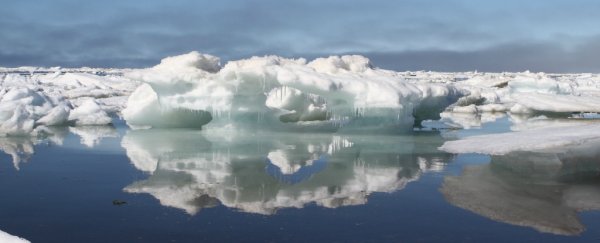Writing about climate change presents an interesting challenge. It's a slow, constant process. Global temperatures rise a little every year, bit by bit accruing disastrous consequences.
We get used to hearing that this year, like many years in recent memory, will be the hottest on record. That glaciers are melting. That food insecurity is increasing. That more and more people face climate-induced natural disasters.
As with any slow-moving (on human timescales) tragedy, it's difficult to sustain the degree of attention and horror that each new development deserves.
But then you see something like this:
Swedish icebreaker #Oden moored to ice floe at #NorthPole #CanArctic #LouisSStLaurent pic.twitter.com/5SDPbf0iTD
— Canadian Coast Guard (@CoastGuardCAN) August 28, 2016
That's a photo of a Swedish icebreaker sitting in open water at the North Pole, published about two weeks ago. (I first saw it retweeted on weather writer Eric Holthaus's Twitter account.)
Let's put that in context. The North Pole has been entirely covered in ice, including during the summer, for thousands of years. That was still the case when I graduated from high school, and I'm 24.
But a few years ago, predictions that our warming climate would cook the Arctic ice cap until it melted came true.
Photos of a lake near the North Pole went briefly viral, then quickly faded from view. Now, the Canadian Coast Guard can publish images of open sea at the North Pole and it can pass largely unnoticed.
(One caveat: Though the CCG describes this image as from the North Pole, we don't know exactly where in the Arctic sea it was shot. I've reached out to them for comment and will update if I hear back.)
The thing is, people know that climate change is a problem. Gallup reports that 64 percent of US adults are worried "a great deal" or "a fair amount" about climate change.
It's hard to stay energised when there's so much else happening to worry about, though, and that often means that the conspiracists and truthers are the loudest voices.
But in a world where a major presidential candidate can offer no policy proposal at all to address climate change, without any apparent political repercussions, I still think a picture of open ocean at the North Pole is worth paying attention to.
This article was originally published by Business Insider.
More from Business Insider:
